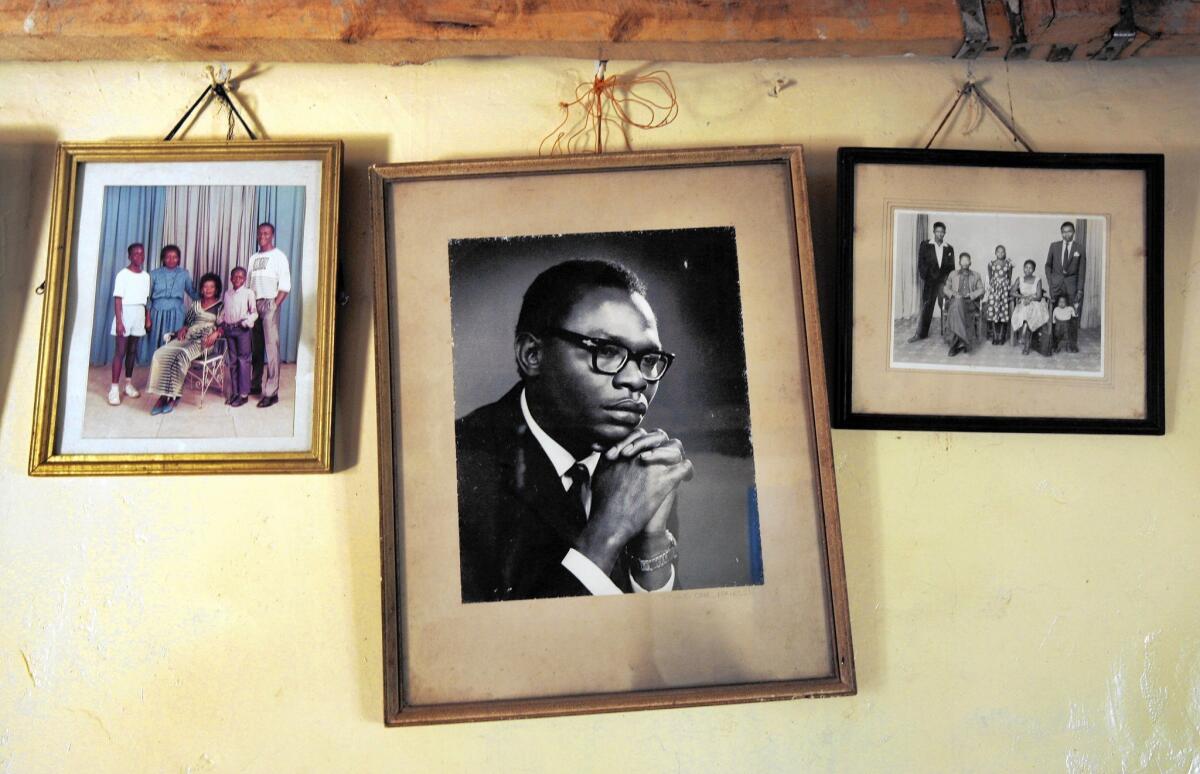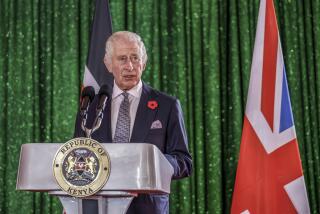In Kenyan village, Obama’s decision not to visit comes as a shock

A picture of Barack Obama Sr., father of President Obama, hangs in the home of the president’s stepgrandmother Sarah Obama in Kogelo, Kenya.
- Share via
Reporting from Nairobi, Kenya — When news broke in Kenya that President Obama wouldn’t be visiting his father’s village during his Kenyan tour, some saw it as strange, even a little outlandish. To others the announcement was simply not to be believed.
Many people remain convinced that somehow he would manage a surprise visit to Kogelo. A mganga, or witch doctor, in the village reportedly tossed some bones and shells, predicting Obama would do so.
But his stepgrandmother, Sarah Obama, and other family members departed for Nairobi, a sure sign that no village visit would occur. Obama also appeared to confirm that there would be no Kogelo trip, describing his first visit to the village in 1988 as “a moment of extraordinary discovery.”
“This one’s more business. You don’t have the time to travel. You don’t have the time to mix it up,” he said in a BBC interview that aired Friday.
Obama landed in Nairobi late Friday, accepted flowers from a small child and shook hands with President Uhuru Kenyatta before taking a seat at a desk on the tarmac, apparently to sign the visitors book (a great tradition in all Kenyan establishments).
The idea that after long years of absence — he last visited Kogelo in 2006 as a senator — Obama would not pay homage at his father’s grave was particularly unthinkable for traditional Luo villagers. The elders had planned to slaughter cows and goats for a great feast to celebrate the return of “our son,” according to local media.
The village feast will go ahead anyway, but it won’t be quite the same.
In the deeply traditional Luo culture of Obama’s father, dead ancestors are ever present, influencing life and even making demands and giving instructions from beyond the grave. It’s believed that these powerful, at times frightening spirits expect that certain ancient graveside rituals be performed, especially after a long absence.
Anthony Omoro, 52, a pastor in Kibera, a sprawling Nairobi slum, said educated urban Luos understood that Obama was on an official visit with important state obligations, but to traditional Luos a failure to visit the grave would be an unfathomable omission.
“They are shocked. They have a fear that the forefathers will be angry,” he said. “They’re disappointed because they don’t understand issues around governance and the logistical issues surrounding a presidential visit. They’re looking at Obama not as a president but as ‘our son.’
“As a son, you don’t have formal arrangements. You just call and say you’re coming, or even if you don’t call it’s OK.”
Columnist Okech Kendo wrote in the Star newspaper: “In the eyes of the villagers, the barriers of oceans, seas and continents do not make these ties any less binding. Relatives would find it traumatizing if Obama does not go ‘home’ during the third year of the last term as U.S. president.”
Kibera is a Luo stronghold. Many here left their villages and their parents in western Kenya decades ago, hoping to find a niche. They got menial jobs, started informal businesses hawking vegetables or clothes, and dragged themselves up in the world.
Traditional Luos believe that those who neglect their obligations to the ancestors will be plagued by dreams where they will find themselves talking to their late father, grandfather or another important figure who has died. To them, the forefathers are not impressed by presidential protocol or security concerns. Nor do they care about a crammed schedule that includes a state dinner, global entrepreneurial summit, bilateral meeting and speech to Kenyans.
According to Luos in Kibera, the wishes of the ancestors cannot easily be denied, without risking making them angry.
“It can come into your dream, like he’s right there talking to you, like you and I are talking now. He can say, ‘You have to go visit your land,’” said Eliakim Giddy, 40, a soccer coach in Kibera and a Luo, enjoying a lunchtime beer in a local pub. “All this comes to you in your dreams: ‘You have to do this and this.’ If he doesn’t do it, eventually he won’t be happy.
“When you wake up, you think, ‘My dad is dead, but I was just talking to him.’ Maybe Obama is experiencing that, but he can’t say.”
Omoro said traditional Luos believe that a deceased husband could visit his widow’s bed and even have sexual relations with her. Or he might visit her and tell her she could find a stash of money if she cut into the mattress. Or he might name people who owed him money and the amounts and information about other unfinished business. A widow who went to people requesting repayment couldn’t be dismissed.
“You cannot deny it,” Omoro said. “It’s taboo. You would immediately be cursed.”
Apart from the deeply felt spiritual yearning for Obama to visit his father’s grave, local people, not only from his own village but other settlements in the area, regard Obama as their anointed son.
“In our culture, when a child is blessed in such a way that he holds some clout, then the whole village is blessed, especially the men,” Omoro said. These beliefs loom large in Kenyan politics: When a man is elected in high public office, clan members expect to be looked after and to prosper.
“Whatever he gets, he can turn around the lives of the people,” Omoro said. “It’s not only his family that is blessed but the whole village and the whole clan. Even those who never saw him physically are saying, ‘Obama is our son.’”
Twitter: @robyndixon_LAT
NEWSLETTER: Get the day’s top headlines from Times Editor Davan Maharaj >>
MORE ON OBAMA:
Obama’s visit to father’s homeland of Kenya shows his new sense of confidence
Kenyans have sky-high hopes for Obama’s visit to his father’s homeland
President Obama again leaves Nigeria off his Africa trip itinerary
More to Read
Sign up for Essential California
The most important California stories and recommendations in your inbox every morning.
You may occasionally receive promotional content from the Los Angeles Times.













